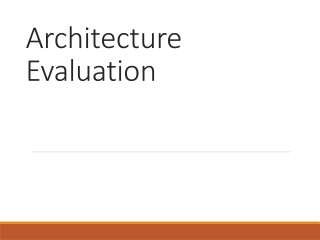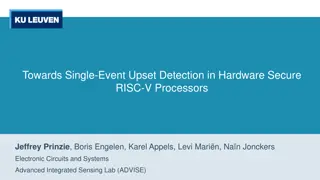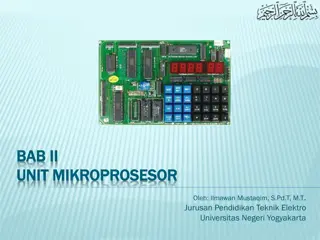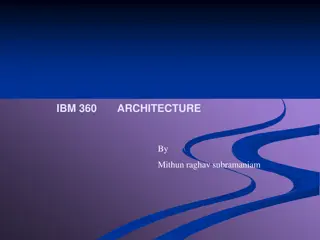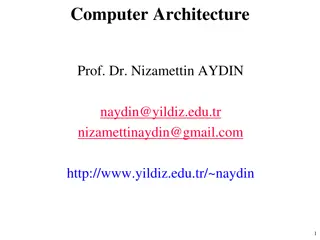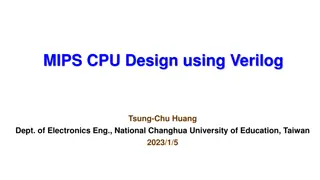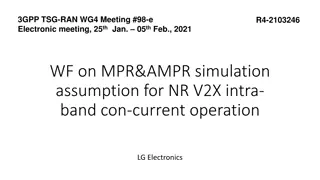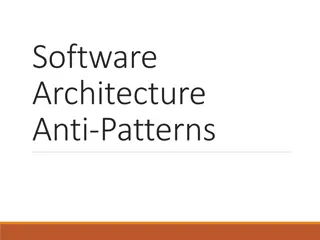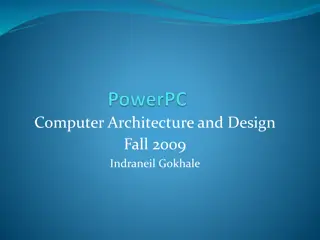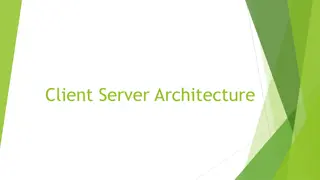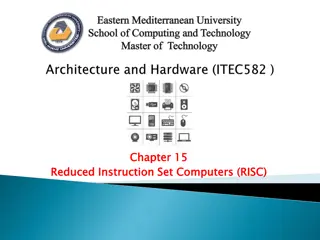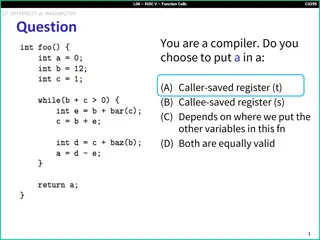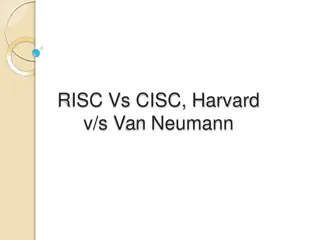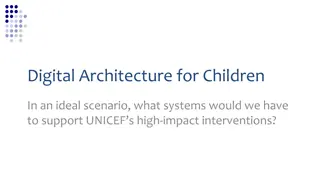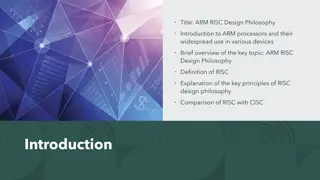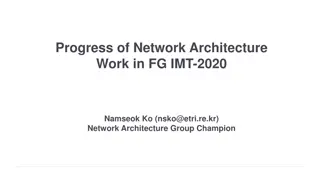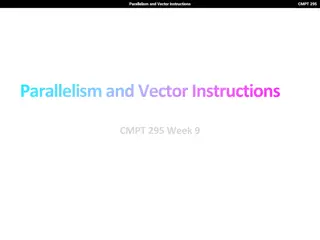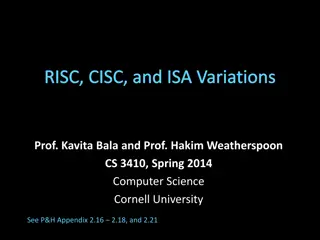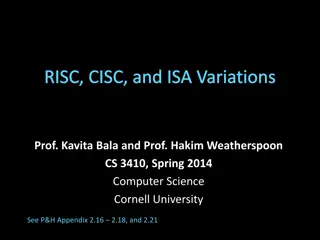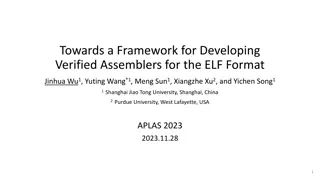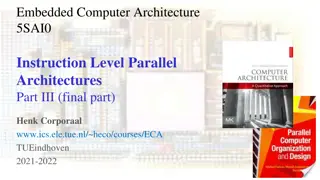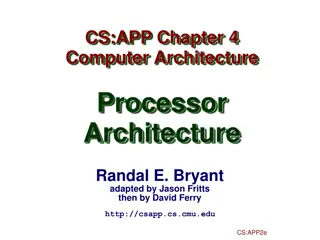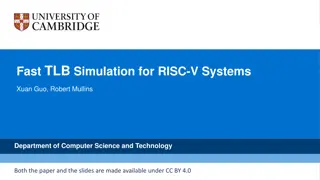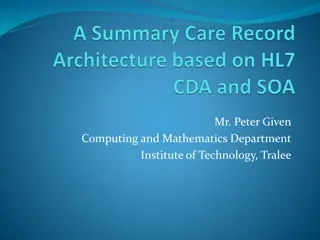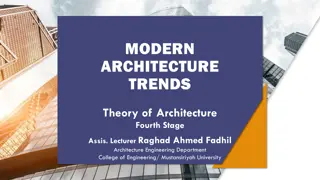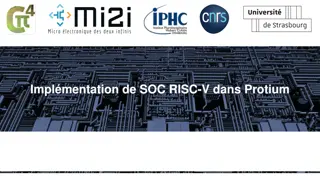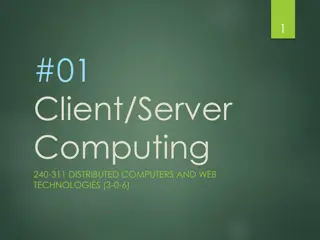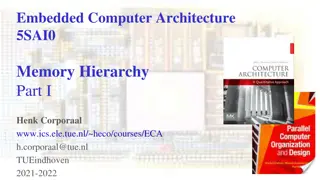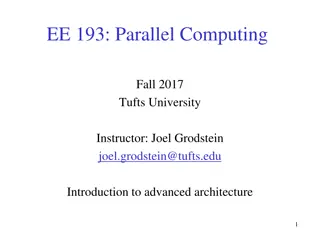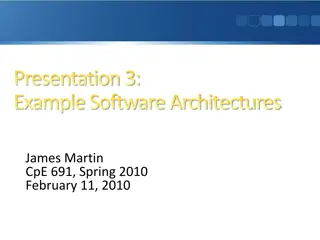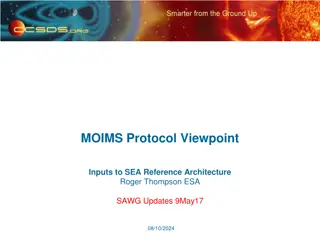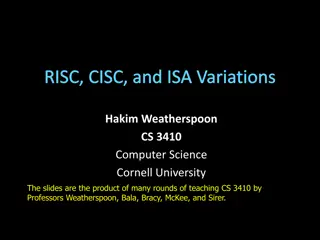Computer Components and Microprocessor: Understanding Computer Architecture
Explore the main computer components and learn about the operation of these components, including inputting, storing, processing, outputting, and controlling. Understand the role of the microprocessor in computer processing and its characteristics such as instruction set, bandwidth, and clock speed.
11 views • 20 slides
❤Book⚡[PDF]✔ The Apollo Guidance Computer: Architecture and Operation (Springer
\"COPY LINK HERE ; https:\/\/getpdf.readbooks.link\/1441908765\n\nDownload Book [PDF] The Apollo Guidance Computer: Architecture and Operation (Springer Praxis Books) | The Apollo Guidance Computer: Architecture and Operation (Springer Praxis Books)\n\"\n
2 views • 6 slides
Architecture Evaluation
Exploring various aspects of software architecture evaluation, including tradeoff analysis methods, factors affecting architecture quality, and the importance of evaluating design decisions early in the software development life cycle to avoid costly changes later on.
3 views • 26 slides
Understanding Computer Organization and Architecture
A computer system is a programmable digital electronics device that processes data as per program instructions to provide meaningful output. It comprises hardware and software components, with hardware being the physical parts and software essential for driving the hardware. Computer organization fo
14 views • 71 slides
Decoupled SMO Architecture Overview
Develop flows showing interaction between SMO modules in the context of open-source architecture using OSC, ONAP, and other code. The objective is to align open-source work with O-RAN trends, improve synergy, reduce duplication, and provide feedback to O-RAN discussions. Related work includes Decoup
4 views • 27 slides
Towards Single-Event Upset Detection in Hardware Secure RISC-V Processors
This research focuses on detecting single-event upsets (SEUs) in hardware-secure RISC-V processors in radiation environments, such as high-energy physics and space applications. Motivated by the potential data errors, unpredictable behavior, or crashes caused by SEUs, the study explores fault inject
4 views • 17 slides
Understanding Microprocessor Architecture and Software Design
Microprocessor architecture and software design play crucial roles in the development of microprocessors. This article explores the internal features, software design types, and characteristics of Complex Instruction Set Computer (CISC) and Reduce Instruction Set Computer (RISC) architectures. It de
7 views • 73 slides
Evolution of IBM System/360 Architecture and Instruction Set Architectures
The IBM System/360 (S/360) mainframe computer system family, introduced in 1964, revolutionized computing by offering forward and backward compatibility, a unified instruction set architecture (ISA), and a balance between scientific and business efficiency. The critical elements of this architecture
0 views • 18 slides
Understanding Computer Architecture: A Comprehensive Overview by Prof. Dr. Nizamettin AYDIN
Explore the realm of computer architecture through the expertise of Prof. Dr. Nizamettin AYDIN, covering topics like RISC characteristics, major advances in computers, comparison of processors, and the driving force for CISC. Delve into the evolution of processors, register optimization, and the tra
0 views • 42 slides
MIPS CPU Design Using Verilog and Instruction Set Architecture Overview
Explore the world of MIPS CPU design using Verilog with a deep dive into Instruction Set Architecture (ISA), SPIM instruction formats, addressing modes, and more. Learn about the key components such as Program Counter (PC), Instruction Memory (IM), Register Files (RF), Arithmetic Logic Unit (ALU), D
1 views • 29 slides
Overview of RF Architecture and Waveform Assumptions for NR V2X Intra-Band Operation
In the electronic meeting of 3GPP TSG-RAN-WG4, discussions were held on the RF architecture and waveform assumptions for NR V2X intra-band operation in band n79. Various options and recommendations were presented regarding RF architecture, antenna architecture, and waveform definitions for efficient
1 views • 7 slides
Understanding Computer Architecture and Organization
Computer architecture and organization are fundamental aspects of computing systems. Computer architecture focuses on the functional design and implementation of various computer parts, while computer organization deals with how operational attributes come together to realize the architectural speci
3 views • 40 slides
Common Software Architecture Anti-Patterns
Anti-patterns in software architecture are commonly occurring solutions to problems that lead to negative consequences. These arise due to insufficient knowledge or experience, misuse of design patterns, and lack of attention to evolving project architecture. Examples include Jumble, Stovepipe, Spag
1 views • 7 slides
PowerPC Architecture Overview and Evolution
PowerPC is a RISC instruction set architecture developed by IBM in collaboration with Apple and Motorola in the early 1990s. It is based on IBM's POWER architecture, offering both 32-bit and 64-bit processors popular in embedded systems. The architecture emphasizes a reduced set of pipelined instruc
2 views • 13 slides
Understanding Client-Server Architecture
Client-server architecture is a computing model where a central server hosts and manages resources and services for client computers over a network. There are different types of clients and servers, each with unique characteristics and roles. This architecture offers various advantages and disadvant
3 views • 15 slides
Evolution of Computing Architectures: RISC Approach
Study on the RISC approach in computing architecture, focusing on key characteristics and advancements since the inception of stored-program computers. Topics covered include the family concept, microprogrammed control units, cache memory, pipelining, and the development of RISC architecture as an a
0 views • 58 slides
Understanding RISC-V Function Calls
In RISC-V function calls, the decision to place variables in caller-saved or callee-saved registers depends on various factors such as recursion and variable usage within the function. Additionally, understanding how function arguments are passed and stored is crucial for efficient program execution
0 views • 5 slides
Contrasting RISC and CISC Architectures
Contrasting RISC (Reduced Instruction Set Computing) and CISC (Complex Instruction Set Computing) architectures, the images and descriptions elaborate on their advantages and disadvantages, with a focus on multiplying two numbers in memory using a CISC approach. CISC processors aim to complete tasks
0 views • 35 slides
Digital Architecture for Supporting UNICEF's High-Impact Interventions
In an ideal scenario, the digital architecture for children would encompass systems such as Enterprise Architecture, Functional Architecture, and Solution Architecture to support UNICEF's high-impact interventions. It would involve integrated platforms for Health Information Exchange, Supply Chain M
1 views • 19 slides
Understanding ARM RISC Design Philosophy and Its Impact
Delve into the world of ARM processors, exploring the RISC design philosophy that underpins their efficiency and widespread application. Learn about key principles, compare RISC with CISC, and discover how ARM's simplicity, orthogonality, and efficient architecture contribute to its dominance in mob
0 views • 12 slides
Progress of Network Architecture Work in FG IMT-2020
In the Network Architecture Group led by Namseok Ko, significant progress has been made in defining the IMT-2020 architecture. The work has involved gap analysis, draft recommendations, and setting framework and requirements. Phase 1 focused on identifying 19 architectural gaps, such as demands for
1 views • 11 slides
Understanding Parallelism and Vector Instructions in CMPT 295
Delve into the world of parallelism and vector instructions in CMPT 295 as you explore fixed-length vector intrinsics, RISC-V concepts, computer programming fundamentals, processor execution processes, scalar and vector loops, and more. Discover the intricacies of memory, data arrays, structs, integ
1 views • 45 slides
Understanding RISC, CISC, and ISA Variations in Computer Science
Explore the differences between RISC and CISC architectures, along with variations in Instruction Set Architecture (ISA). Dive into the intricacies of processor design, performance factors, and assembly languages. Get insights into the concepts of control units, memory units, pipelines, and datapath
0 views • 37 slides
Variations in Computer Architectures: RISC, CISC, and ISA Explained
Delve into the realm of computer architectures with a detailed exploration of Reduced Instruction Set Computing (RISC), Complex Instruction Set Computing (CISC), and Instruction Set Architecture (ISA) variations explained by Prof. Kavita Bala and Prof. Hakim Weatherspoon at Cornell University. Explo
0 views • 55 slides
Framework for Developing Verified Assemblers for ELF Format
This research paper discusses the importance of verified assemblers in the context of verified compilation, focusing on the development of verified assemblers for the ELF format for multiple architectures like X86, RISC-V, and ARM. The framework aims to be configurable, extensible, and general to su
0 views • 32 slides
Proposed Way Forward for Service-Oriented Architecture (SOA) in Space Missions
Proposed establishment of a Working Group by the CESG to develop a Service-Oriented Architecture (SOA) framework for space mission operations within the CCSDS. The focus includes identifying services, use cases, architecture definitions, and business cases to enhance CCSDS-wide interoperability and
0 views • 7 slides
Embedded Computer Architecture - Instruction Level Parallel Architectures Overview
This material provides an in-depth look into Instruction Level Parallel (ILP) architectures, covering topics such as hazards, out-of-order execution, branch prediction, and multiple issue architectures. It compares Single-Issue RISC with Superscalar and VLIW architectures, discussing their differenc
0 views • 49 slides
Introduction to Y86 Instruction Set Architecture
Y86 Instruction Set Architecture is a simplified pseudo-language based on x86 (IA-32) architecture. It involves implementing the Fetch-Decode-Execute cycle, where instructions are fetched from memory, decoded, and executed. The Y86 ISA offers a simpler set of instructions and formats compared to x86
0 views • 25 slides
Fast TLB Simulation for RISC-V Systems - Research Overview
TLB simulator for RISC-V systems introduced to evaluate TLB designs with realistic workloads, focusing on performance rather than cycle accuracy. The design sacrifices some accuracy for improved performance, making it suitable for meaningful software validation and profiling tasks.
0 views • 29 slides
Enhancing Healthcare Data Sharing with Service-Oriented Architectures
This paper explores how Service-Oriented Architectures (SOA) can be integrated with the HL7 Clinical Document Architecture to facilitate the sharing of Summary Care Records between healthcare information systems. It highlights the benefits of a federated architecture based on SOA and coding standard
0 views • 51 slides
SunGuide Software Users Group Meeting Highlights January 26, 2023
Highlights from the SunGuide Software Users Group meeting on January 26, 2023, include discussions on RISC management, equipment behavior, enhancements, safe tow rotations, and predefined plans for FDLE alert types. Topics covered range from managing equipment in RISC events to allowing users to sel
0 views • 22 slides
Exploring Modern Architecture Trends: Expressionism and Bauhaus Movement
Delve into the world of modern architecture trends, focusing on Expressionist architecture in Europe during the early 20th century and the influential Bauhaus movement in Germany. Expressionist architecture emphasized emotional effects through distorted forms inspired by nature, while the Bauhaus sc
0 views • 10 slides
Implementation of RISC-V in Protium: Overview and Analysis
RISC-V, a royalty-free open-source Instruction Set Architecture (ISA), has gained popularity since its inception in 2010. This article delves into the historical background, extensions, integer registers, and the Pulp platform's RISC-V cores. The implementation of RISC-V in Protium is discussed, pro
0 views • 13 slides
Overview of 5G System Architecture and User Plane Functionality
This content showcases various aspects of 5G system architecture, including system handover, non-roaming architecture, service-based architecture, and user plane functionality. It delves into the control plane functions, user plane functions, and core network endpoints of the 5G network. The images
0 views • 49 slides
Understanding Client/Server Computing Architecture
Client/Server Computing architecture separates clients and servers over a network, allowing for file sharing, resource allocation, and service requests. Clients initiate services from servers, with transparent server locations and message-passing transactions. Systems with C/S architecture include f
0 views • 18 slides
Understanding Memory Hierarchy and Different Computer Architecture Styles
Delve into the concepts of memory hierarchy, cache optimizations, RISC architecture, and other architecture styles in embedded computer architecture. Learn about Accumulator and Stack architectures, their characteristics, advantages, and example code implementations. Explore the differences between
0 views • 52 slides
Understanding Advanced Computer Architecture in Parallel Computing
Covering topics like Instruction-Set Architecture (ISA), 5-stage pipeline, and Pipelined instructions, this course delves into the intricacies of advanced computer architecture, with a focus on achieving high performance by optimizing data flow to execution units. The course provides insights into t
0 views • 12 slides
Software Architecture Design for Document Filter System: A Case Study
This presentation delves into the software architecture design and implementation of a Document Filter System (DFS) aimed at efficiently finding relevant information. It discusses the architecture's effectiveness in supporting diverse applications, multilingual document searching, complex query func
0 views • 33 slides
MOIMS Protocol Viewpoint for SEA Reference Architecture Updates
This content describes the MOIMS Protocol Viewpoint inputs to the SEA Reference Architecture updates by Roger Thompson from ESA SAWG. It includes details about the graphical conventions, data store elements, organizational domains, network layers, communications protocols, and space communications c
0 views • 21 slides
Understanding Instruction Set Architectures (ISAs) in Computer Science
Explore the concepts of RISC, CISC, and ISA variations in computer architecture. Dive into the differences between MIPS, ARM, X86, and other ISAs, focusing on load/store, arithmetic, control flow, and more. Gain insights into the evolution and variations of ISAs, and discover the alternatives beyond
0 views • 37 slides
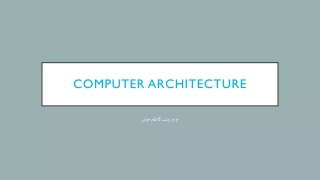
![❤Book⚡[PDF]✔ The Apollo Guidance Computer: Architecture and Operation (Springer](/thumb/21611/book-pdf-the-apollo-guidance-computer-architecture-and-operation-springer.jpg)
